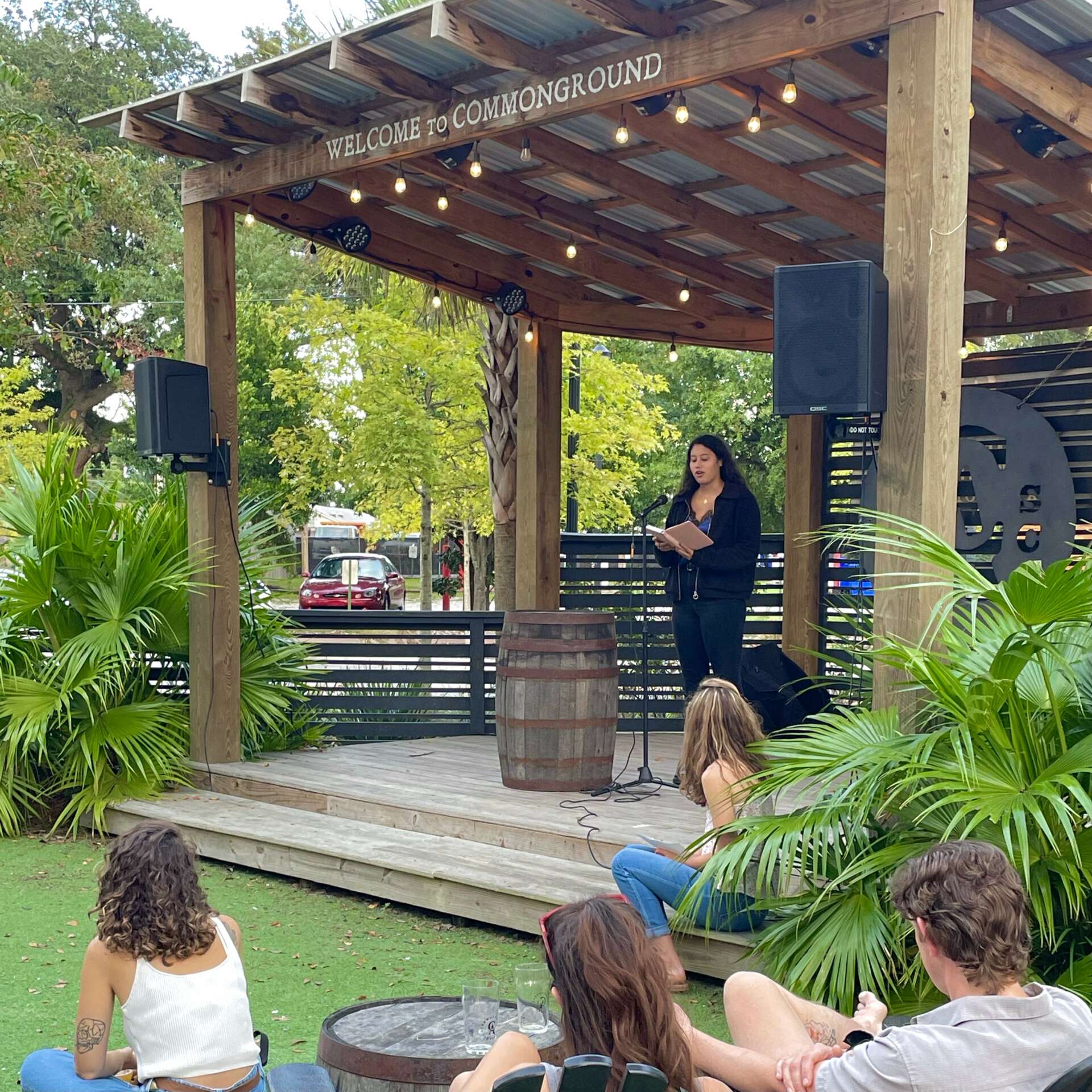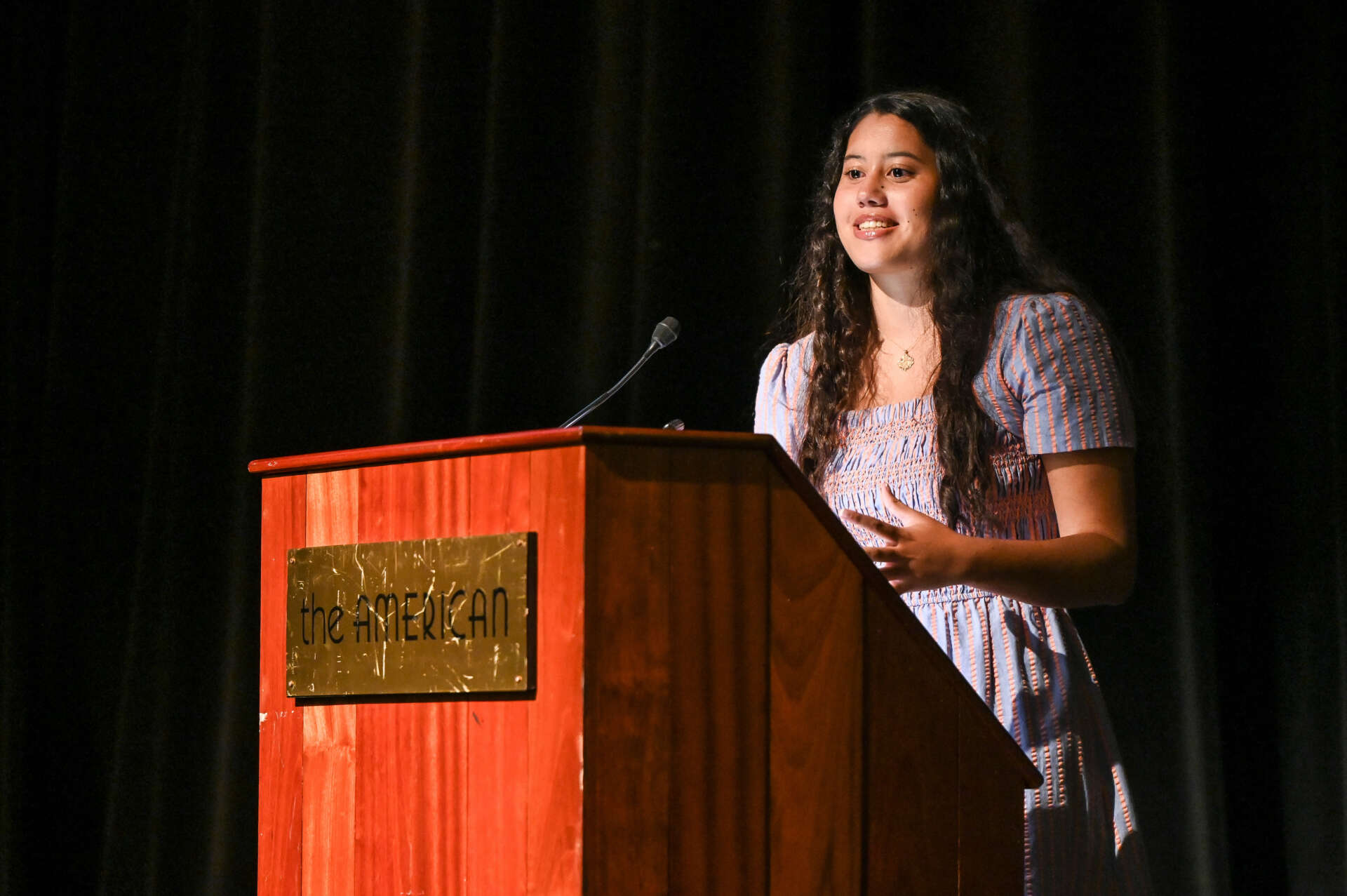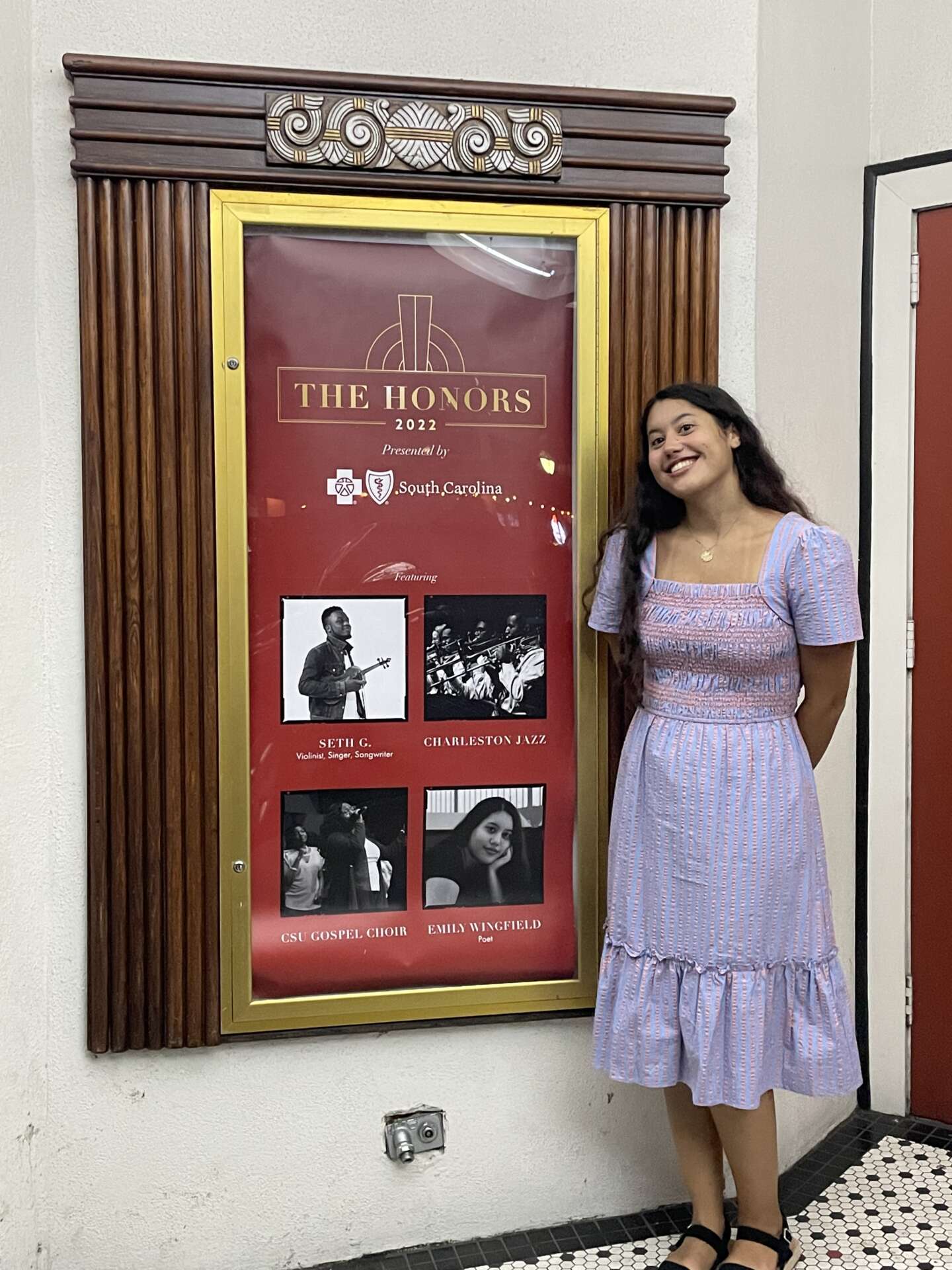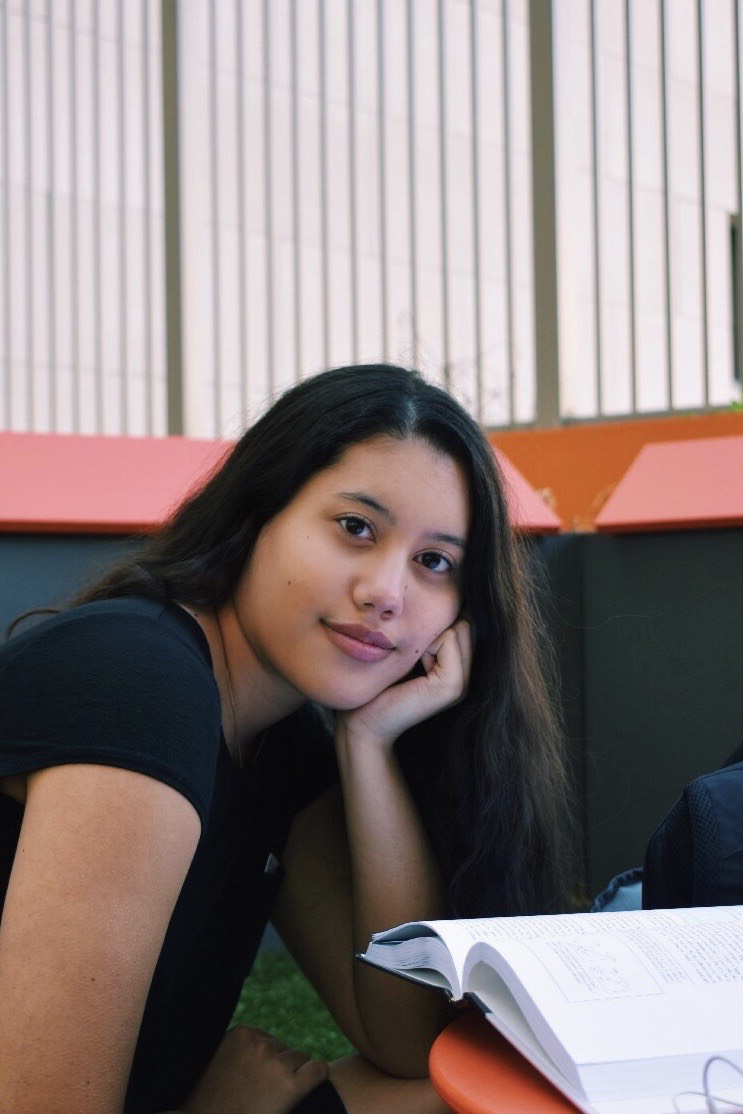We recently connected with Emily Wingfield and have shared our conversation below.
Emily, thanks for joining us, excited to have you contributing your stories and insights. Can you talk to us about a project that’s meant a lot to you?
Without a doubt, the most meaningful project that I have had the pleasure of working on has been my online poetry collective, Tenderheart Collective. At the beginning of 2021, I found myself wanting to connect with more poets and creatives whose stories and experiences are similar to mine, but who I can still learn from. So I decided to create a space where I could do exactly that. In January, I connected with 5 other incredible BIPOC womxn poets and we launched Tenderheart Collective. We define ourselves as “an online poetry house led entirely by BIPOC womxn devoted to uplifting our voices and the voices of poets like us.” I have been blessed through this work to meet Salma Alejo, Sofía Aguilar, Michelle Garcia, Yasmine Bolden, and Molly Rufus, all of whom have become like family to me. Although we are all scattered across the US (some of us in Virginia, one in DC, some in Los Angeles, and myself in Charleston), we have still been able to establish incredibly strong relationships with one another. Not only do my fellow Tenderhearts support my poetry, but they support me in all my endeavors and I have already learned more from them than I ever thought possible. I have known these womxn for less than a year, but despite that I feel incredibly loved, supported, and as if I have known them my entire life. Ultimately, our goal with the collective is to share our stories boldly and unapologetically, to show the world that our stories matter, even if they’ve been left out of the narrative in the past. Tenderheart Collective has become one of the most important things not just to me as a poet, but as a human being. I have found a family in this community and I truly cannot express how grateful and honored I am to be a part of it.


As always, we appreciate you sharing your insights and we’ve got a few more questions for you, but before we get to all of that can you take a minute to introduce yourself and give our readers some of your background and context?
I am a Black and AAPI creative originally from the Greater Philadelphia Area and currently living in Charleston, South Carolina. My primary medium of work is poetry, however I have significant experience with academia-related works and I am deeply passionate about historical research in addition to my creative writing.
I have published 2 original chapbooks of poetry. My debut collection, BARELY THERE, SURVIVING, was self-published in 2021. My sophomore collection, THE CORNER OF FISHBURNE AND ASHLEY, was published by Bottlecap Press in 2022. I am currently at work on my third overall collection, and first full-length collection, CADENZA: NOTES FOR POETS AND THE SOUL, which will be released in 2023. My work has been featured in, or is forthcoming from, Forbes & Fifth, Quiddity, Mag 20/20, Free Verse Press, amongst others. In addition to my personal creative pursuits, I am a founding member (alongside 5 other poets) of the online BIPOC womxn-led poetry collective, Tenderheart Collective. The goal of this collective is to uplift our own voices and stories, as well as the voices and stories of those like us. We can be found on Instagram @tenderheartcollective and on Twitter @tenderheartcltv.
I hold a Bachelor of Arts in History from Arcadia University and have plans to return to graduate school in the future, most likely to pursue a Master of Arts in History, and later a Doctorate in History. Professionally, I currently work as the Executive Assistant to the Senior Vice President and Chief Strategy Officer, as well as to the full Development and Stewardship Department, at the Coastal Community Foundation of South Carolina.
I have always been passionate about the art of writing, but it was not until my time in university that I truly began to explore writing deeply, both creatively and professionally. As a history major, I was broadly interested in the intersection of politics and culture in the second half of the twentieth century. I focused my research on the stories of marginalized groups in the United States, mainly focusing on the 1960s-present. Specifically, I looked at dissent efforts within these groups and the history of revolutionary social movements. I am also interested in the intersections between politics and activism and popular culture. And although my primary focus is United States history, I have expanded my research in the past to other countries and geographic regions. For my undergraduate senior thesis, I investigated post-punk Britain, specifically the band Joy Division and the city of Manchester. My research investigated both how the political and economic climate of Britain at the time (1970s to early 1980s) influenced the emergence of the post-punk scene, as well as how the band Joy Division emerged and how and why they faced such success in such a short period of time.
In terms of creative writing, specifically poetry, my love and devotion to that art form was sparked as a sophomore in high school, however I did not start sharing my work until my third year of university. I largely write free form poetry, however I have experimented with structure and form in the past. Much of my poetry is centered around my personal experiences and feelings as a BIPOC and queer womxn. I am multiracial (Black, Asian, white) and bisexual, and much of my poetry touches on these identity characteristics. My poetry is also largely connected to mental health and my experiences with mental health difficulties throughout my life. Ultimately, I write what I know. I write about my personal life and stories, but in a manner that I hope allows others to relate. I hope that through my poetry, other individuals can resonate with the emotions and experiences I explore, to ultimately understand that we are not alone, but that there is a whole world of people and possibilities out there that are directly connected to and supportive of each and every one of us.
If I were to summarize my inspirations and motivations both professionally and creatively, I would boil it down to this: I want to make a difference and I want to heal. Through my professional and creative pursuits, I hope to spur positive change not just in the world around me, but within myself. I use writing, both creative and professional, as a way to explore the issues and topics I am passionate about and to directly confront the struggles and questions that arise as I walk through this life. And that is what I am most proud of. I am proud of the fact that I am using my talents and abilities to spur positive change both individually and collectively, with the ultimate goal of creating a more open, loving, equitable, and just world.
You can find out more about me on my website (emilywingfield.co), by following me on Instagram (@_emilywingfield), or by visiting my Linktree (linktr.ee/emilywingfield).
What do you find most rewarding about being creative?
The most rewarding aspect of being an artist and creative is by far the connections I am able to make with fellow creatives. Through the creative world, I have met so many incredible people who have taught me so much about my craft and even just about life. There truly is nothing more rewarding than connecting with someone who shares the same passions as you. Building that network of fellow artists and creatives has been a blessing for me. I have found so many people who not only support my work, but whose work I am able to support as well. We are able learn from each other and evolve alongside one another, which ultimately makes us not just better creatives, but better human beings.
I spoke a bit about it earlier, but my online poetry collective, Tenderheart Collective, is a perfect example of this. I have a group of people who give me unwavering support and who I can speak to about every aspect of being a creative, both the positives and negatives. I have also found similar support from Marcus Amaker, Charleston’s Poet Laureate, who has been an incredible mentor to me. Other fellow Charleston poets, such as Jammie Huynh, Gracie Bell, Maci Petrolle, and so many others, have also been incredibly great connections to have. These peers have been incredibly supportive of me and I am beyond grateful to know each and every one of them.
I firmly believe that as artists and creatives, rather than competing with one another, we should uplift and support one another. I wish nothing but complete success for each person in my network in the creative scene, and having that network of support has allowed me to find even more passion and drive in my art. Because not only do I want it for myself, but I want to be able to share my work with those around me. In my opinion, true success is found in meaningful collaboration and unity, and that is especially important for success in the creative world.

Can you tell us about a time you’ve had to pivot?
Pivoting is a part of life. Sometimes you’ll think you are where you need to be, but something will come up that makes you realize some sort of a change is needed. And making that change is critical. The largest pivot I’ve experienced in life was my recent move from my hometown in Pennsylvania to Charleston, South Carolina. I felt somewhat stuck in Pennsylvania and did not feel that I would be able to learn and grow in the way I wanted to. So I took the leap and I moved to Charleston. I moved not because someone told me to, but because it was what I needed and it was the best decision for MYSELF.
And it certainly paid off. I have accomplished so much since moving to Charleston. I graduated from university, I published my second collection of poetry, I have been published in a variety of journals and anthologies, both for my poetry and my academic writing, I have been featured in newspapers, I have been invited to speak at various events related to my poetry, and been paid to do so. I also started my first full time job and have already evolved so much as a young professional.
But the accomplishment that matters the most that I see at the center of this pivot in life, is the change I have made mentally. I no longer go through life doing things simply because it is what others want from me, but I live life for MYSELF. As a creative, it is very easy to get trapped in the cycle of negative self-talk and to undersell yourself or sacrifice your creativity because other people tell you that’s what you need to do. Moving to Charleston has taught me to pursue all of my passions intensely and fully because it is what I want. I have learned to find happiness and value in myself simply as myself. External validation is no longer the only thing that matters to me. I write poetry because it makes ME happy. I explore my passion for history and historical research because it is something that makes ME happy. I work hard in my career because it is a job that is rewarding for ME and brings ME happiness.
Now that does not mean that I do not care about what others think or that I am selfish and only think about myself, but devoting time and energy to bettering myself mentally and finding peace and happiness internally has given me more strength and motivation to help others. Because I am allowing myself the space and time to heal, I am then able to put work into that ultimate goal I have in life of spurring positive change in the world. It may sound cheesy, but I firmly believe that if you do not make a difference at the individual level, you will not be able to make a difference beyond that. I am devoted to finding joy and success internally, and that in turn is allowing me to make a positive impact externally.
Contact Info:
- Website: https://www.emilywingfield.co/
- Instagram: https://www.instagram.com/_emilywingfield/?hl=en
- Linkedin: http://www.linkedin.com/in/emily-wingfield
- Other: https://linktr.ee/emilywingfield
Image Credits
Headshot taken by Bianca Gonzales. BARELY THERE, SURVIVING cover design credits to Paloma Zozaya. THE CORNER OF FISHBURNE AND ASHLEY cover design credits to Bottlecap Press.


